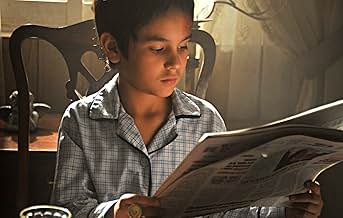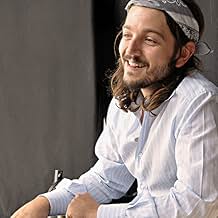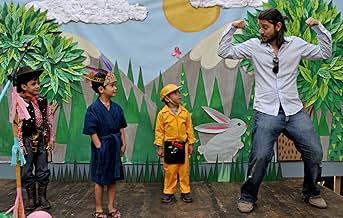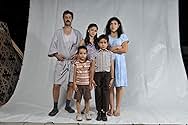ÉVALUATION IMDb
6,8/10
1,5 k
MA NOTE
Ajouter une intrigue dans votre langueAbout a peculiar young boy who, as he blurs reality and fantasy, takes over the responsibilities of a family man in his father's absence.About a peculiar young boy who, as he blurs reality and fantasy, takes over the responsibilities of a family man in his father's absence.About a peculiar young boy who, as he blurs reality and fantasy, takes over the responsibilities of a family man in his father's absence.
- Director
- Writers
- Stars
- Prix
- 2 victoires et 8 nominations au total
Geraldine Galván
- Selene
- (as Geraldine Alejandra)
Marcela Ruiz Esparza
- Maestra
- (as Marcela Ruíz Esparza)
Avis en vedette
10utah4-1
I must confess that during the first few minutes of "Abel," I became confused. In fact, I almost gave up watching it via Netflix Instant.
But I'm so pleased I didn't.
Truth be told, what prompted me to log on to "Abel" was that it was directed by Diego Luna, an actor whose work I deeply admired when I first met him in his brilliant and sensitive performance in "Y Tu, Mama, Tambien." But I'm happy that I hung on, because I discovered Luna's gentle sensitivity to the struggles of Mexico's lower-middle-class in this, his first film as a director.
Which made me remember my own childhood when I also was a poor kid growing up in western Pennsylvania.
Sr. Luna clearly has a great future as a director.
Because the "truths" his work reveals are "universal."
But I'm so pleased I didn't.
Truth be told, what prompted me to log on to "Abel" was that it was directed by Diego Luna, an actor whose work I deeply admired when I first met him in his brilliant and sensitive performance in "Y Tu, Mama, Tambien." But I'm happy that I hung on, because I discovered Luna's gentle sensitivity to the struggles of Mexico's lower-middle-class in this, his first film as a director.
Which made me remember my own childhood when I also was a poor kid growing up in western Pennsylvania.
Sr. Luna clearly has a great future as a director.
Because the "truths" his work reveals are "universal."
1. It's Diego Luna.
2. It's Diego Luna.
3. It's Diego Luna.
And if that's not enough to get you to watch this film, you must not know Diego Luna.
The film explores cultural familial roles, mental health culture and stigma in Mexico, and forces viewers to examine the effects of family in culture.
Basically, it's amazing.
The acting is spectacular. The performances are absolutely spot on. Casting was perfect. The music is perfect. The photography is perfect. Lighting, set, and characterization are perfect. Per-freaking-fection.
2. It's Diego Luna.
3. It's Diego Luna.
And if that's not enough to get you to watch this film, you must not know Diego Luna.
The film explores cultural familial roles, mental health culture and stigma in Mexico, and forces viewers to examine the effects of family in culture.
Basically, it's amazing.
The acting is spectacular. The performances are absolutely spot on. Casting was perfect. The music is perfect. The photography is perfect. Lighting, set, and characterization are perfect. Per-freaking-fection.
The film has its funny, sad and thoughtful moments and is very much about the mental health of a child who in his father's absence wants to take his place. It is well made, but throughout the story, my overwhelming thought was about the bad parenting and why the mother let the child take the place of the father and why she let the boy dominate as the patriarch (for not all fathers should be) and submit to him. The epitome of woke child rearing. Let your child be whatever it wants, what ever the damage to them or to you. Don't set boundaries or confront problems before they get out of control, rather just pander to the little darlings. 6* because of the quality of the story telling and film making.
Diego Luna's first film is a good movie about a kid with a mental disorder. The boy named Abel (Christhoper Ruiz Esparza) is the main character in this story about a middle-class Mexican family. This boy take the place of his father (nobody known about him by 2 years)trying to fill out the space at the father in the lives of his brothers. This movie has drama and comedy in an interesting mix. Jose Maria Yazpick (Anselmo's character)deserves a special mention, very good actor. The movie change from drama at beginning, comedy in the middle and return to drama. This is a god film but needs more punch at end to become a great, I noted that Luna needed more experienced to make it an extraordinary movie.
From a brief description, Abel sounds like a lighthearted comedy. A boy, possibly autistic, takes charge in his household when he realizes that his mother is struggling to raise her three children. After staying up all night watching Pedro Infante movies, he begins to act like a father, taking care of his younger brother and older sister. However, problems arise when he takes his role too far. The film gets slightly disturbing when Abel begins thinking he is actually an adult. There are predictably cute moments that occur when a child acts like an adult, but they are constantly undermined by slightly disturbing moments. Don't get me wrong, Abel is still somewhat of a comedy, but it has a much darker side.
Luna is clearly well versed in Lacan (or, at the very least, he's read Mulvey). Abel's problem is with his identification. Something went wrong in the mirror stage and now his entire understanding of the symbolic order is incorrect. He rejects the name of the father and things get strangely Oedipal. In a climactic sequence, Abel's father makes use of a mirror in an attempt to correct Abel's identificatory issues.
Usually, Lacan is evoked for commentaries on the medium itself. Luna gives the ideas a fresh take by tackling them within the plot. If you've read Lacan or are familiar with his ideas, you'll definitely get a kick out of this film. Even if you haven't (but if you're interested in film, you should definitely read Mulvey's short article Visual Pleasure and Narrative Cinema) you can still enjoy the film as a bizarre story about a kid who challenges his absent father.
Luna is clearly well versed in Lacan (or, at the very least, he's read Mulvey). Abel's problem is with his identification. Something went wrong in the mirror stage and now his entire understanding of the symbolic order is incorrect. He rejects the name of the father and things get strangely Oedipal. In a climactic sequence, Abel's father makes use of a mirror in an attempt to correct Abel's identificatory issues.
Usually, Lacan is evoked for commentaries on the medium itself. Luna gives the ideas a fresh take by tackling them within the plot. If you've read Lacan or are familiar with his ideas, you'll definitely get a kick out of this film. Even if you haven't (but if you're interested in film, you should definitely read Mulvey's short article Visual Pleasure and Narrative Cinema) you can still enjoy the film as a bizarre story about a kid who challenges his absent father.
Le saviez-vous
- AnecdotesFirst feature film directed by Diego Luna. His first and previous effort as director was a documentary.
- ConnexionsFeatures La oveja negra (1949)
- Bandes originalesAbel
Written and Performed by Julieta Venegas
Meilleurs choix
Connectez-vous pour évaluer et surveiller les recommandations personnalisées
Détails
- Date de sortie
- Pays d’origine
- Sites officiels
- Langue
- Aussi connu sous le nom de
- Абель
- Lieux de tournage
- sociétés de production
- Consultez plus de crédits d'entreprise sur IMDbPro
Box-office
- Budget
- 1 000 000 $ US (estimation)
- Brut – à l'échelle mondiale
- 2 706 679 $ US
- Durée1 heure 22 minutes
- Couleur
- Rapport de forme
- 1.78 : 1
Contribuer à cette page
Suggérer une modification ou ajouter du contenu manquant






























